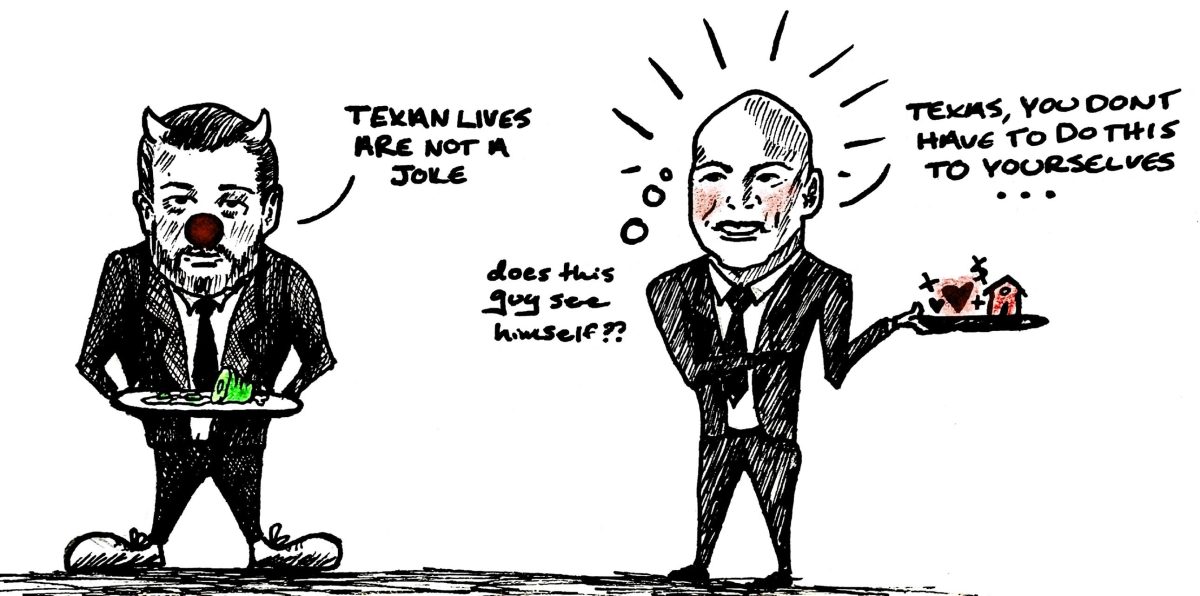In last week’s Trinitonian, Alexander Jacobs asked nonbelievers to answer the question: What specific evidence would make you believe in God? He argued that the universe points to the existence of God because, “The beginning of the universe was the beginning of all space, time and matter, [so] its cause must transcend these.”
After some Googling, I found all kinds of pre-Big Bang theories currently under scientific consideration, from the idea of an older universe spawning our own, to chaotic inflation theory — the idea that universes can ‘inflate’ to full proportions from nothing. In quantum physics, particles can pop in and out of existence without any ‘cause’ at all.
So I’m not convinced by Alexander’s argument that we need a supernatural cause to explain the universe. Unfortunately, since we’re not physicists, we might not be able to settle this question to our satisfaction.
Alexander also requested that we read arguments from the best Christian theologians before doubting God’s existence. I’ve read (some of) them, and I’d rather respond to the main points in his article than write about physics and metaphysics for the rest of mine.
What kind of evidence would it take for me to believe in God? It would take some evidence, any evidence at all, that most people would consider reliable when not discussing their own religion.
Although Alexander seems unsure on this point, I would certainly accept his example of a miracle: an amputated arm or leg growing back after a prayer. If he can provide it, I can believe it. But I suspect we’ll be waiting a while.
Failing a miracle, where is the evidence for a Christian God? I won’t accept stories of personal religious experiences, so I’m probably supposed to look to the Bible. But the Bible is exceptionally poor evidence for God’s existence.
At the time it was written, people believed that demons, evil spirits, magicians, oracles, ghosts and witches literally walked among them. The Bible itself is a superstitious book, full of passages that have, quite apart from being wrong, caused human suffering and death.
For example, Exodus 22:18: “Thou shalt not suffer a witch to live,” and similar Biblical passages resulted in the executions of thousands of innocent women in medieval Europe.
A rational observer can’t accept the miracles in the Bible — turning water to wine, exorcising demons, raising the dead — without accepting the miracles from every other religion and superstition that then existed. This is reason enough to reject Christianity.
A rational person should also reject Christians’ calling these parts of the Bible the “flawed, human” passages, and the more popular parts the “true, divinely-inspired” ones. Unless you have already accepted Christianity, there is no reason to embrace the nicer verses as true and reject the superstitious or awful as false.
I hope this explains why I’m not Christian specifically. I’ll add the general issue that first made me question the existence of any loving God: the problem of evil. If God is all-powerful and all-good, why is there so much evil in the world?
Usually, Christians blame it on free will: God couldn’t give humanity freedom without allowing us to commit evil. But this answer falls pathetically short of the question’s scope. Most of the ‘evil’ in the world, i.e. pain and suffering, is not caused by people at all.
Just look at the top causes of death worldwide: heart disease, stroke, respiratory conditions and diseases, cancer, diarrheal diseases and fungal infections. None of those can be blamed on human free will — but God permits them all.
How many children would you have to watch dying in horrible pain before you intervened? In 2016, 5.6 million children died, all under five years old. This, in the most advanced age the world has ever known.
For most of the time God watched, the world would’ve been a much crueler place. Wild animals still live how early humans did: They die either of being eaten alive or starving to death. Presumably their suffering is also necessary for us to be free.
As much as I might want to, I find it almost impossible to believe in a loving God who stands idly by as disease, famine and war afflict his children. Yet if God exists, we know that he does; we know that even if he created one of the better possible worlds for us to live in, God still allows unfathomable amounts of suffering to occur before his eyes.
We know that every good father takes more responsibility for his children than God the Father does for us; no father would allow his child to die of a curable disease. For that matter, no father would ever allow one of his children to kill another in the name of “free will.”
Any loving God thus seems impossible to rationally justify. As for Christianity, I see no reason to believe the Bible over the holy books in thousands of other religions.
So, now that I’ve responded to Alexander’s question, I’d like to ask him: What would it take for you to stop believing?









Eric Breaux • Jul 12, 2018 at 4:18 pm
Something can’t come from nothing because nothing is required for there to be nothing. Something existing would then be a change from there being nothing to there being something, but if there is nothing, there is nothing that can change. And if something from nothing were possible then so many different types of things would have always been spontaneously existing, some of them doing or causing the same things possibly. Likewise with things that are the same and any amount of them potentially doing and causing different things, since if a cause is unnecessary, there is nothing to prevent this being possible. The requirements for science, then, would not exist, since nothing would have to be a certain way to cause a specific result from it.
Particles coming in and out of empty space can’t be evidence for something from nothing, because empty space is still space which is still something, or else there would be nothing for those particles to exist in. Empty space and vacuums have a minimal amount of energy in them to produce these particles, have dimensions that can bend and be measured, and the amount of energy, that obviously can also be measured, can change. This is all only possible because of how already existing physics make it so, so not only can nothing not be seen or tested to verify the possibility of it, but nothing is by definition what does not exist, so there being nothing is as self contradictory as there being no such thing as truth.
Nothing can have a beginningless infinite past because it would take an infinite amount of time for anything to happen then, so nothing ever would because there never would be that much time. So for anything to exist there has to be something or someone to cause them. The only type of entity that could cause the first beginning would have to be independent of time and space.
Tony K. • Mar 28, 2018 at 5:41 pm
My counter-questions: What specific evidence would make you believe in Gods (plural)? How about the idea that the entire universe is a manifestation of the dharmakaya (the eternal indestructible True Principle of Buddhism)?
Greg Ryan • Mar 2, 2018 at 9:02 am
Matthew 4:23 And Jesus went about teaching in their synagogues, preaching the gospel of the kingdom and healing all kinds of sickness and all kinds of disease among the people.
I believe if “the Church” went about preaching, teaching and healing it would be much more difficult to have a realistic discussion on atheism.
When Jesus was walking, preaching, teaching and healing the argument wasn’t this isn’t happening or never happens it was whether or not He was truly the Son of God.
I believe the disciples of Jesus need to heal the sick, cleanse the lepers, raise the dead and cast out demons (Matthew 10:8). Then this conversation would either end or take a totally different turn.
Bill Thacker • Mar 1, 2018 at 9:33 am
“[Alexander Jacobs’ argued that the universe points to the existence of God because, “The beginning of the universe was the beginning of all space, time and matter, [so] its cause must transcend these.””
As an atheist, I can agree with that. The appearance of our universe implies something greater that produces such events. It’s evidence for *something*, but how is it rational to leap to the conclusion that something must be God?
If theists are happy to assume God always existed and don’t question how God originated, I can be content to assume that the Big Bang always existed (it did, after all, initiate the very concept of “time”) and not know how it originated. And I can take comfort that my curiosity about the cause of the Big Bang is purely intellectual; it doesn’t stem from some need to validate dubious beliefs, stemming from bronze-age myths, that my parents instilled in me when I was a child.
Robert Landbeck • Mar 1, 2018 at 6:34 am
The question “What specific evidence would make you believe in God?” has a profound new answer! The first wholly new interpretation for two thousand years of the moral teachings of Christ has been published. Radically different from anything else we know of from theology or history, this new teaching is predicated upon the ‘promise’ of a precise, predefined, predictable and repeatable experience of transcendent omnipotence and called ‘the first Resurrection’ in the sense that the Resurrection of Jesus was intended to demonstrate Gods’ willingness to reveal Himself and intervene directly into the natural world for those obedient to His Command, paving the way for access, by faith, to the power of divine Will and ultimate proof!
Thus ‘faith’ becomes an act of trust in action, the search along a defined path of strict self discipline, [a test of the human heart] to discover His ‘Word’ of a direct individual intervention into the natural world by omnipotent power that confirms divine will, law, command and covenant, which at the same time, realigns our mortal moral compass with the Divine, “correcting human nature by a change in natural law, altering biology, consciousness and human ethical perception beyond all natural evolutionary boundaries.” Thus is a man ‘created’ in the image and likeness of his Creator.
So like it or no, a new religious teaching, testable by faith, meeting all Enlightenment criteria of evidence based causation and definitive proof now exists, and carries all the implications that suggests. Nothing short of an intellectual, moral and religious revolution is getting under way. To test or not to test, that is the question? More info at http://www.energon.org.uk
Michael McElroy • Mar 8, 2018 at 12:09 pm
Well now! That was delightfully insane.